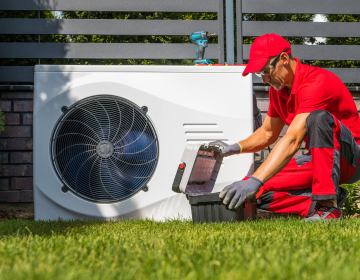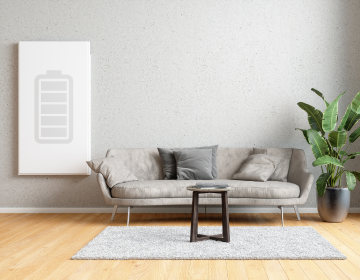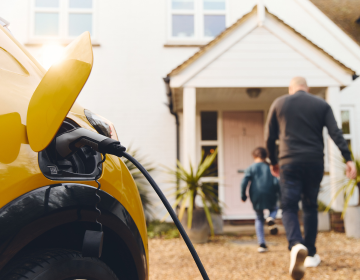Sava
What’s hot in housing? The power of heat pumps
13 December 2023 3361 Views

Heat pumps are become more prevalent across the UK to power our homes’ heating requirements and they are only likely to become more popular, with enquiries about their usage and functionality currently on the rise. This article answers some of the crucial questions that may be asked by homebuyers, equipping agents with valuable information to provide to their customers.
What is a heat pump?
A heat pump is an energy-efficient appliance designed for heating your home. It extracts heat from the outside air, even in cold temperatures, and transfers it indoors, providing you with central heating. It does this by using a refrigerant within the unit that absorbs and releases heat as it circulates between the outdoor and indoor units. They behave rather like a refrigerator would if you put it outside and opened the door.
Why use a heat pump?
With the UK's ambitious goal of achieving net zero by 2050, there's a shift away from mains gas toward the electricity grid, steering us clear of fossil fuels. Heat pumps emerge as a crucial part of this solution, offering a more environmentally friendly alternative to conventional heating methods.
How efficient are heat pumps?
The majority of heat pumps have an efficiency of 300%. This means that heat pumps produce three units of energy for every unit of electricity they consume. To put this into context, most new gas boilers are only around 90% efficient.
What is the difference between ‘air-source’ and ‘ground-source’ heat pumps?
Understanding the distinction between air-source and ground-source heat pumps is key. Air-source heat pumps harness warmth from the outside air, while ground-source heat pumps use underground pipes to extract heat from the more stable temperature below ground. Both types transfer this heat indoors for heating, allowing you to choose the source that best suits your needs. Ground source heat pumps are more efficient, however, they cost more to install.
Are they expensive to run?
Currently there is a cost cap of 27p/kWh for electricity and 7p/kWh for gas. Considering this and the fact that the average UK home uses 11,500 kWh every year for space heating and hot water (according to Ofgem), running an air source heat pump would cost around £1,035 per year, whereas operating a gas boiler would cost around £900 per year. This assumes paying the maximum rate at all times, when in reality making use of time-of-use tariffs, or even renewable sources such as solar panels, would cause this to be much lower.
Are heat pumps noisy?
The average noise generated from an air source heat pump due to the presence of the outdoor fan unit is between 40-60 decibels. For context, 40 decibels would be similar to hearing birds chirping outside, whereas 60 decibels is comparable to background music. Ground source heat pumps are quieter with maximum decibel levels of 42; this is no louder than the average boiler or fridge.
What are the maintenance requirements?
Generally, heat pumps require servicing every two to three years, though some warranties require annual check-ups. Check with your manufacturer and warranty provider over the terms of your agreement.
Is maintenance expensive?
Maintenance checks are, on average, around £150 for heat pumps, which is slightly more expensive than gas boilers which are between £50 and £100 to get checked. It should be noted though that there is currently a shortage of qualified heat pump installers, and with uptake increasing these costs will likely fall as more installers come onstream.
Will they work with my solar panels?
Your heat pump can indeed work seamlessly with solar panels. The electricity generated by the solar panels can power your heat pump, offering both cost savings and an eco-friendly heating solution for your home.
How much do they cost to install?
Air source heat pumps cost between £11,000 and £16,400 to install according to energy supplier EDF. Ground source heat pumps are more expensive ranging from £17,000 to £35,000 for supply and installation. Currently, there is a government grant available called the ‘Boiler Upgrade Scheme’, which provides £7,500 towards the cost of installing a heat pump.
What is the lifespan of a heat pump?
Modern heat pumps have an estimated lifespan of between 20 and 25 years. This is more than current boilers which should last between 10 and 15 years.
Do householders need to operate heat pumps differently?
Heat pumps work best at lower flow temperature settings, and this might mean you need bigger radiators at home to spread the warmth effectively. For the best efficiency, it's suggested to use wet underfloor heating.
In conclusion, heat pumps offer an energy-efficient alternative to conventional home heating systems, helping occupants to reduce their carbon footprint. Whilst running costs might appear more expensive, there are ways for carbon-conscious occupants to lower these costs. It is also important to consider maintenance and lifespan, noting particularly that heat pumps require less frequent servicing and can last significantly longer than your average boiler.
This article was written by Sava’s Energy Data Consultant, Samuel Lott.
Sava has provided education, technology and professional services to the housing sector for the past 40 years. To find out how we support housing providers with their zero-carbon planning and skills training, and work with career changers looking to enter the residential surveying profession, head to www.sava.co.uk.
Previous Articles

From estate agent to residential...

Buying a home with battery...

Electric Vehicle Charging: What Homebuyers...
.png)
Renters Reform Bill ...




